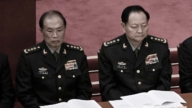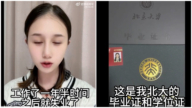【新唐人2012年3月13日讯】中共原中纪委副书记刘锡荣在人大浙江代表团会议上,公开批评中共官员“严重超编”等诸多现状,他说老百姓再勤劳、也养不起这么多官员,他建议立法进行管理整顿。分析指出,刘锡荣作为人大代表只是在团会上建议立法,一个不在位的原纪委书记在这种情况下谈立法,等于空谈。
3月10号,刘锡荣在中共人大浙江代表团会议上批评中共官员严重超编。他说中国当前“乱设机构,乱定级别”,没有“编制法”,给“买官”、“卖官”留下了无限的空间。
他举例说,一些乡镇好几百个干部,小汽车停了好几排。一些地方政府秘书长有几十个,每个秘书长都要给房子、配汽车,而这些支出最终都是老百姓买单。
他说,“老百姓再勤劳,也养不起这么多官啊!”中国公务员人数已从4年前的600多万,增加到1000多万,平均每年增加100万人。
前“山东大学”教授孙文广指出,中共官员编制上没有法律、没有监督,官员们都想多拉几个人进入官场,自己人多了好办事。
孙文广:“中国这个官员人浮于事,大家都看在眼中啊,这是个事实,你到一些机关去看,这些当官的非常空闲,没有多少事情要处理,为什么要设那麽多职位呢?就是共产党腐败的表现之一。就是任何人当了一个县委书记或省委书记,那麽他希望收集一些人,中国的机关又没有一个很严格的法律,就是说编制到底应该有多少?这个限制里没有规定,所以这样的自然就起来,越膨胀。”
孙文广认为制定一个“编制法”是必要的,也是大多中国民众的呼声。
孙文广:“有的县里,一个县里边啊,教育局副局长能有8、9个之多,这是常有的事啦,这种都是它们腐败的一种表现,我觉得制定一个“编制法”这个还是有必要的,否则的话,它必然要膨胀。”
刘锡荣力荐将政企分开、政资分开、政事分开、政府与市场中介组织分开。他说,目前这“四不分”是中国诸多问题的根本来源。他建议出台《反集体腐败法》、《编制法》和《国民收入分配法》等。
大陆老记者铁流指出,刘锡荣不在位了才提出建立“编制法”,等于空谈。
老记者铁流:“你发声又怎么样?人一走茶就凉,一下来说话就不起作用了,在台上又不敢说,下来了说又等于没说,这是中国的现实。”
刘锡荣还建议将审计署从大陆国务院划分出来给人大直接管辖。他指出,审计署和中纪委合署办公,自己人审自己人是审不出名堂的。
独立候选人姚立法指出,刘锡荣做为人大代表,却只是在浙江代表团会议上提出建议根本不会有实质效果。
姚立法:“他并没有真正有按照法定和程序行使他的权力,他只是在代表团会上发言的时候 , 说说而已,这样它不能产生很大的效应,更不可能形成一股力量。所以说,近日两会不会有实质性的效果。”
孙文广指出,目前中共公务员增速之快,增数之多,令人震惊,如果再不实施这个“编制法”,必然还会继续膨胀,这绝非国家和人民之福。
新唐人记者采李韵、柏妮采访报导。
Establishment of Organisations Law Recommended:
Civil Officials Overstaffed.
Liu Xirong, former Deputy Secretary for Chinese Communist
Party (CCP) Central Commission for Discipline Inspection,
said in a Zhejiang delegation meeting that CCP officials are
seriously overstaffed.
He stated that no matter how hardworking, the public still
couldn’t afford to feed so many officials. Liu suggested legislatures to take action.
Analysts said Liu, who is no longer in his former post,
discussed legislation on a delegation-level, as chit-chat.
On March 10, in the Zhejiang delegation meeting of National
People’s Congress (NPC), Liu Xirong spoke.
He said that the CCP regime is seriously overcrowded with
Officials.
In addition, the current chaos reflects “casually setting up
organisations and giving official ranks”.
He said, the CCP has no “Establishment
of Organizations Law”.
The purchase and sale of official positions are
consequently rampant.
Liu Xirong said that in some small townships, there were
hundreds of cadres. We see many rows of cars in car parks.
Some local governments have tens of party secretaries,
and it has to purchase houses and cars for each of them.
All bills are paid by ordinary people in the end.
Liu said, “No matter how hardworking, the public still
couldn’t afford to keep so many officials!”
He stated that there were 6 million public servants four years
ago. Now it was increased to 10 million. One million was added each year.
Sun Wenguang, former Prof. in Shangdong University said
that the CCP has no authorised law of organisations.
It has no monitoring system. All officials want to recruit
more people, as more staff means it is easier to handle jobs.
Sun Wenguang: “The CCP officials are overcrowded, we all
can see, it is the fact.
If you walk into an office, the officials there are very relaxed,
they don’t have many jobs to do.
However, why do they setup so many titles and positions?
This reflects one aspect of CCP corruption.
Anyone in a role of secretary in county party committees,
or a secretary of a party branch, hopes to increase his staff.
There is no strict law on governmental organisations, on
how many staff should be there. There is no rule of restriction.
So naturally, the CCP’s organisations have been expanded.”
Sun Wenguang believes that it is necessary to setup a
government establishment law. This is also the voice of most Chinese people.
Sun Wenguang: “In a county, there are 8-9 deputy secretaries,
it is common place. This is a manifestation of CCP corruption.
I think to setup an “Establishment of Organisation Law” is
necessary, otherwise, staff would certainly increase.”
Liu Xirong strongly suggests to separate government function
from enterprises, investment, social undertaking, and market intermediaries.
He said the current four aspects haven’t been divided, which
is the leading cause of many problems.
He recommended launching an “Anti-Group Corruption Act”;
“Establishment of Organizations Law” and “National Income Distribution Law”.
Tie Liu, a senior journalist in China said that Liu Xirong is
no longer in the former position.
His recommendation to “Establishment of Organizations Law”
is just chit-chat.
Tie Liu: “What has happened, even you spoke out?
When a person left, the tea is cold. He has no power as soon as he left the position.
He dared not to speak out when he was in the post, but he
spoke out when he is not in the position; It is a chit-chat. It is a real China.”
Li Xirong also suggested separating the Audit Commission
from State Council, handing it over to NPC.
He said that Audit commission and Central Commission
for Discipline Inspection shares staff and offices. To inspect it’s own people won’t work.
Yao Lifa, an independent NPC representative candidate, said
that being a representative, Liu Xirong only mentioned it in Zhejiang delegation meeting. It won’t have a practical effect.
Yao Lifa: “He hasn’t exercised his rights according to
statutory and procedural law.
He just talked and gave a speech in a delegation meeting.
By this way it won’t have a great effect, nor form a power.
So the Two Sessions will have something to come out, but
it won’t have a practical effect.”
Sun Wenguang pointed out that the excessive increase
in numbers of civil staff is shocking.
If we don’t setup “Establishment of Organizations Law”,
the numbers will keep expanding.
It is definitely not a positive thing for the country and people.































